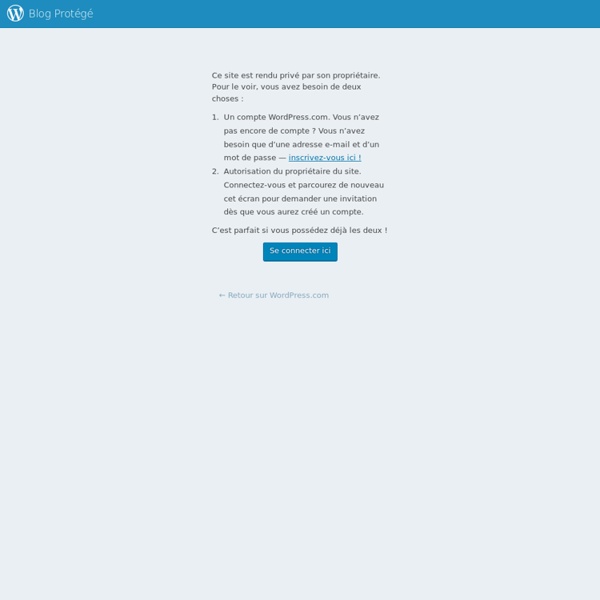



https://jftavernier.com/2013/11/09/plus-de-50h-de-video-sur-les-usages-du-numerique-dans-leducation/
Related: sharing best practice • Identité numérique / Réseaux sociaux • Ressources institutionnelles - Formation au numérique • usages numeriques • CULTURE NUMERIQUEKey Issues in Language Teaching #1: influences on curriculum design Professor Jack Richards joins us this week for an exciting webinar on teaching beyond the classroom – sign up here! – and over the next five days, we’ll be sharing a short series of extracts from his new book. Key Issues in Language Teaching is a comprehensive and extensively researched overview of the key issues in language teaching today, available in paperback and soon as an enhanced ebook with embedded video content.
Is Google Making Us Stupid? - Nicholas Carr Illustration by Guy Billout "Dave, stop. Stop, will you? Stop, Dave. Will you stop, Dave?” CEFRIO <object classid="clsid:D27CDB6E-AE6D-11cf-96B8-444553540000" width="100%" height="100%" id="3DIssue"><param name="movie" value="files/3dissue.swf" /><param name="FlashVars" value="backgroundColour=#1a1a1a&backgroundImage=assets%2Fbackground%2Fbackground.jpg&preloaderColour=#ffffff&myURL=1&skinless=1" /><param name="quality" value="high" /><param name="bgcolor" value="#1a1a1a" /><param name="wmode" value="transparent" /><param name="scale" value="noscale" /><param name="menu" value="true" /><param name="devicefont" value="false" /><param name="allowScriptAccess" value="sameDomain" /><param name="allowFullScreen" value="true" /><!--[if !
Global Connections: Powerful PD with Craig Kemp – PTE011 It’s powerful Professional Development and it’s right in the palm of your hands. Top Tips and Insights for Connecting Globally with Craig Kemp. CLICK PLAY & LISTEN NOW + SUBSCRIBE : ITUNES – RSS – STITCHER (It’s Free) Show Guest – Craig Kemp Craig Kemp I’m a Kiwi (New Zealander) living in Singapore, teaching in an Australian Curriculum School.I’m a globally connected educator and support people to do the same.
Reading List: Using Social Media for Research Collaboration and Public Engagement The bulk of discussion around why academics use social media primarily focuses on social media as a dissemination strategy to get more citations and views of scholarly articles. But social media has also opened up new and exciting ways for researchers to collaborate online. Following an exchange on Twitter, we volunteered to pull together a reading list of posts on how researchers are using social media for collaboration and public engagement purposes. Social media use in academia is a highly active and changing landscape. The posts we’ve compiled here fall under four main themes: why researchers are using social media, digital strategies for capturing the value of social media, critical engagement with the challenges emerging, and a list of our best social media how-to guides for professional development and collaboration. Why do researchers use social media to communicate and collaborate online?
Statistician explores how faculty can excel in blended learning environments Want to be rated an excellent instructor by your students? Facilitate learning, show respect for students and communicate well and you are virtually guaranteed to get an overall rating of excellent, irrespective of anything else. The University of Central Florida's Chuck Dziuban said this unbreakable rule is based on data mined from 1.2 million end-of-course student evaluations of their professors and instructors. If the students rate them excellent in all three of those categories, they will inevitably be rated as excellent overall.
Copyright & Attribution – a mistake = lesson learned! Straight to the point …. We all make mistakes! Mistakes are OK, mistakes help us learn! However, sometimes, these mistakes can be avoided and last week I made a mistake that should have been avoided and I was (thankfully) held accountable to it. I used an image without citing its source. Image source: Flipping the flipped classroom For a while now, the paradigm of ‘flipping’ the classroom and reversing the way teachers and lecturers traditionally approach developing students knowledge has been gaining quite a lot of credence in educational circles. The flipped classroom has been made popular by Salman Khan and the Khan Academy and is based around the concept of students getting the input they would traditionally receive from the lecture or lesson in the form of videos or set texts that they study before class. Then in the classroom they do more practical work (similar to the kinds of tasks they would usually do as homework) while the teacher monitors and acts as support. There’s a lot to be said for this approach, especially in the traditional lecture based classroom, but for us as communicative language teachers I often wonder if this is really anything new. I’ve known teachers for years who have been setting grammar study as homework and then doing the more practical communicative tasks in the classroom.
Collaborative-multiauthors-multiculture Education When WE use Social-Media, especially Twitter, lots of users know already about a PLN (Personal [Professional] LEARNing Network) and through it WE get a MASS of information on a daily base. So, not easy at all when people don’t know how-to organize that information… Click image ===> What is a PLN? <=== Well, it is actually NOT that difficult when people are Up-To-Date with THEIR Professional Development and learned already about Curation!